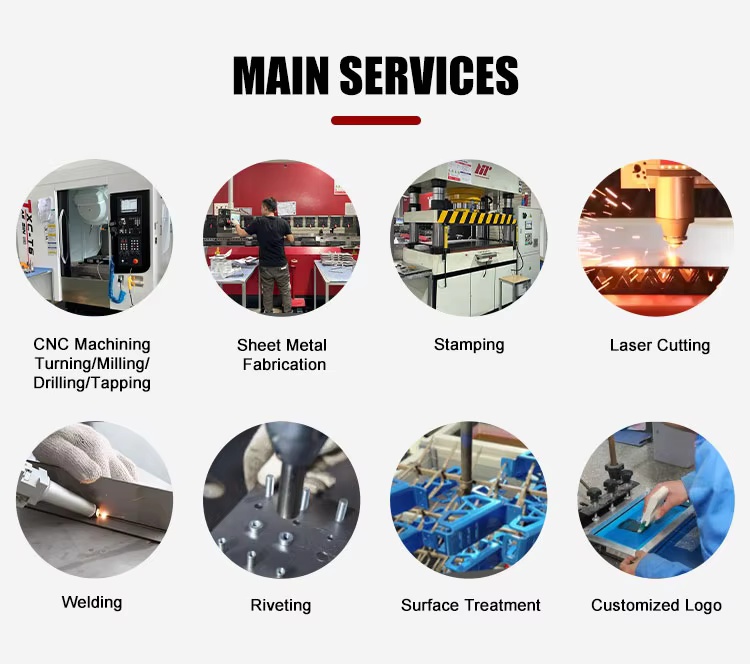Metal Bending Fabrication: Precision Engineering for Industrial Excellence Overview Metal bending fabrication is a critical process in modern manufacturing, offering the ability to shape and form metal into precise configurations required across various industries. This specialized service combines advanced techniques with skilled craftsmanship to produce components that meet exacting standards. Whether it's for structural support, mechanical systems, or custom industrial applications, metal bending design and production play a pivotal role in delivering durable and reliable solutions.
The integration of metal bending technology applications ensures that each product is tailored to specific needs, making it an essential part of the industrial landscape. Key Features: The metal bending fabrication process is designed with precision and efficiency in mind. Utilizing state-of-the-art machinery and expert knowledge, this service offers a wide range of capabilities, including but not limited to forming complex shapes, achieving tight tolerances, and ensuring consistent quality. Each project is approached with attention to detail, ensuring that the final product meets both functional and aesthetic requirements. The use of high-quality materials further enhances the durability and performance of the fabricated components. Additionally, the flexibility of metal bending allows for customization, making it suitable for a broad spectrum of applications. Detailed Description Metal bending design and production involve the transformation of raw metal sheets or profiles into finished products through a series of controlled bending operations. This process requires a deep understanding of material properties, as well as the mechanical forces involved in shaping metal. The application of metal bending technology enables manufacturers to create intricate designs that would be difficult or impossible to achieve using other methods. From simple bends to multi-axis formations, the possibilities are vast. The process typically begins with detailed planning and engineering, followed by the actual bending operation using hydraulic, mechanical, or CNC-controlled machines. Each step is carefully monitored to ensure accuracy and consistency. The result is a product that is not only structurally sound but also aesthetically pleasing and functionally superior.
Use Cases: Metal bending fabrication is widely used in numerous industries where strength, durability, and precision are paramount. In the construction sector, it is employed to create structural components such as beams, columns, and brackets. In the automotive industry, it is essential for manufacturing body parts, chassis components, and interior structures. The aerospace industry relies on metal bending for producing lightweight yet robust elements used in aircraft and spacecraft. In the energy sector, it plays a key role in the fabrication of turbine parts, support structures, and piping systems. Additionally, in the manufacturing of heavy machinery and equipment, metal bending ensures that components fit perfectly and perform optimally. These diverse applications highlight the versatility and importance of metal bending for industrial use. User Testimonials: Clients from around the world have consistently praised the quality and reliability of metal bending fabrication services. One customer noted, "The precision and attention to detail in their work exceeded our expectations. We were able to meet tight deadlines without compromising on quality." Another user shared, "We needed custom-shaped components for our industrial project, and the team delivered exactly what we needed. Their expertise and professionalism made the entire process seamless." A third client stated, "From initial design to final delivery, the level of service was outstanding. We will be working with them again." These testimonials reflect the satisfaction and trust that clients place in the metal bending fabrication process. Frequently Asked Questions: What types of metals can be bent using this process? Metal bending fabrication can accommodate a variety of metals, including steel, aluminum, stainless steel, brass, and copper. Each material has unique properties that influence the bending process, and experienced fabricators are equipped to handle these variations effectively. How accurate is the metal bending process? Modern metal bending techniques, particularly those involving CNC machinery, offer exceptional accuracy. Tolerances can be maintained within very tight ranges, ensuring that each component meets the required specifications. Is there a minimum order quantity for metal bending services? Most metal-bending fabricators offer services for both small and large production runs. Whether you need a single custom piece or a large batch, the process can be adapted to suit your needs. Can metal bending be used for complex shapes? Yes, metal-bending technology applications allow for the creation of complex and intricate shapes. Advanced machinery and skilled operators make it possible to achieve even the most challenging designs. How long does the metal bending process take? The duration of the process depends on the complexity of the design and the volume of the order. However, many fabricators strive to deliver projects efficiently without sacrificing quality. What are the advantages of choosing professional metal bending services? Professional metal bending services provide access to advanced equipment, skilled labor, and comprehensive design support. This ensures that the final product is of the highest quality, meets all specifications, and is delivered on time.










